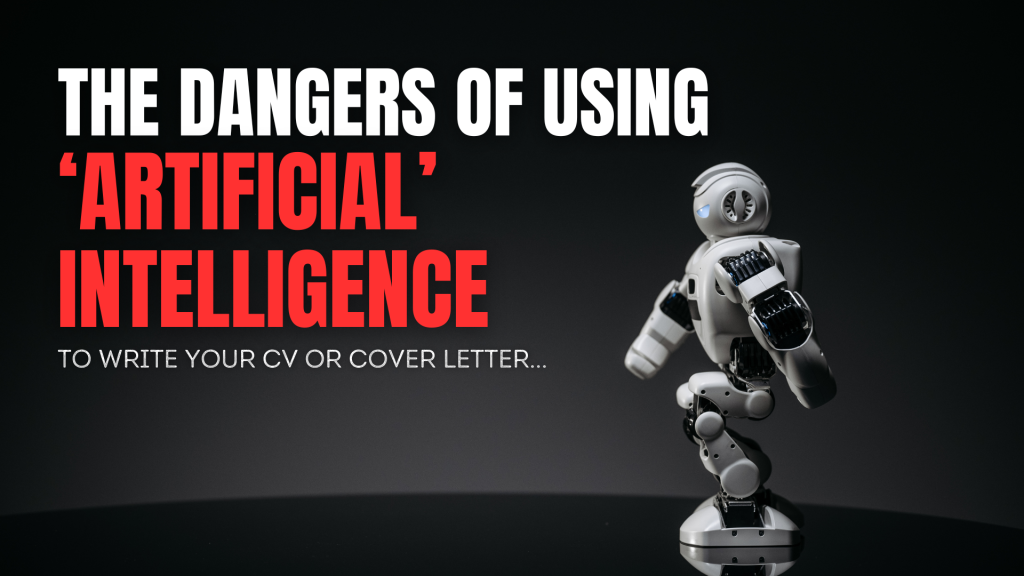Looking for a job can be a very stressful, emotional and frustrating process for job seekers and that’s because it’s not just about finding a role that suits your skills and aspirations (which is hard and competitive enough), it’s about navigating a system that sometimes feels impersonal and outdated. For most, your first opportunity to create a good first impression isn’t in person where your personality and energy can set you apart from the competition, but on paper through your CV and cover letter. And it’s been that way for decades.
Nothing can blow up a job seeker more than the inevitable silence that can come after a lot of hard work has been put into crafting a compelling CV and cover letter. This absence of any feedback or acknowledgment beyond the most boring of CRM generated automated responses can be disheartening and leave you questioning if your efforts have even been seen. But now is not the time to trade in the best of your human qualities for speed or artificial intelligence.
Today, we look at the dangers of asking ChatGPT to write a resume or cover letter on your behalf:
Lack of Authenticity
If your cv or cover letter sounds “overstated” or too wordy, recruiters may suspect it’s been AI-generated and you haven’t taken the time to personalise it. In today’s competitive market, recruiters are really looking for candidates who stand out and who’s voice, personality and storytelling ability jumps off the page, not something that sounds manufactured and inauthentic.
Inaccuracies or exaggerations
Let’s face it, AI tools like ChatGPT can sometimes add a little bit of mayo to your “what can I help with?” request and make some pretty broad assumptions about your skills or expertise. If you leave the response raw or unedited, it could leave you exposed and looking a little bit silly under questioning from a recruiter.
Keywords
Applicant Tracking Systems (ATS) scan for role-specific keywords, however, prompting ChatGPT to inject every keyword from the job ad or job description could ‘overcook’ it completely. This is something that recruiters look for and you risk being filtered out before another human sees your application.
Cookie-cutter style
Recruiters read hundreds of resumes and cover letters every week and if yours sounds like the same AI-produced fluff they’ve already seen, the recruiter might smell a rat. It’s important to know that recruiters have already become immune to the overuse of cliches and grammar that AI can inject into communications and if you’re not careful, your application may end up swiftly in a recycle bin.
Ethical red flags
Recruiters and employers are now actively screening for AI-written résumés and cover letters and for good reason. While using AI tools can be extremely fast and helpful, relying on it entirely can raise ethical concerns and create doubts in the mind of the recruiter. If an application is discovered to be largely AI-generated, it can trigger red flags about your communication skills, attention to detail and willingness to put in genuine effort.
It can trip you up
If your AI friend writes in a way that doesn’t match how you normally speak or work, you may struggle to back it up in an interview. Your voice on paper should sound like you in person.
Waffle On
Let’s face it, ChatGPT can waffle on. You need be make sure your documents are clear and concise and only call out the information that is necessary to present your message. AI can sometimes “fill in gaps” or exaggerate details in a way that might not feel like you at all. The safest way is to use AI or ChatGPT as your drafting assistant, not your ghostwriter. Let it help you with structure, ideas or a bit of creativity but always inject your own voice, check for accuracy and personalise it with real examples of the real you.
Don’t Sound Artificial
Even small exaggerations can backfire:
- AI loves long, multi-clause sentences.
- AI sometimes inserts commas where you wouldn’t or splits sentences unnaturally.
- AI can write overly formal sentences and waffle on that one statement too long.
- AI tends to write sentences that can sound aspirational rather than in a real human voice.
- AI might replace simple words with unnecessarily complex ones.
The Risk
- You may not progress beyond the recruiter’s inbox.
- You may lose instantly credibility.
- You run the risk of misrepresenting yourself.
- You might end up sounding like all the rest.
- You come across as unauthentic.
- It just won’t land well.
Unfortunately, your job application still remains your greatest opportunity to create a good first impression. Handing that responsibility over to your AI friend might save you some time but it could also cost you the opportunity you have been waiting for. When it comes to your career, your voice matters and so does the way you present yourself. Proceed with caution!


